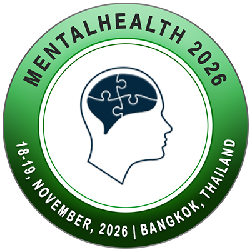Track: Suicide and Self Harm

“Understanding and Preventing Suicide and Self-Harm: Approaches to Intervention and Support”
This session will address the critical issues of suicide and self-harm, focusing on their risk factors, warning signs, and prevention strategies. Attendees will learn about the psychological, social, and environmental factors that contribute to suicidal thoughts and behaviors, as well as the distinction between self-harm and suicidal intent. The session will cover crisis intervention techniques, including how to conduct risk assessments and provide support to individuals in distress. Participants will also explore strategies for promoting mental health and resilience, and discuss the role of community resources and professional help in preventing suicide and self-harm.
Understanding the Psychology of Self-Harm
This session will explore the psychological factors that lead individuals to engage in self-harm. Attendees will examine the emotional and cognitive processes involved, particularly how self-harm can serve as a coping mechanism for managing intense emotional pain. Emphasizing the importance of understanding these underlying factors will highlight effective care strategies for individuals who self-harm.
Suicide Risk Assessment and Intervention Strategies
Accurate suicide risk assessment and timely intervention are critical. This session will provide participants with tools and techniques for evaluating suicide risk and implementing effective intervention strategies. Attendees will learn about best practices for working with individuals at high risk, including crisis intervention and safety planning approaches to reduce the risk of suicide.
The Role of Trauma in Suicide and Self-Harm
This session will examine the connection between trauma and the development of suicidal and self-harming behaviors. Participants will explore how traumatic experiences, particularly in childhood, increase vulnerability to these behaviors. The session will also emphasize the importance of trauma-informed care when providing treatment to individuals experiencing self-harm or suicidal thoughts.
Cultural and Societal Influences on Suicide and Self-Harm
Cultural and societal factors can significantly influence the prevalence and perception of suicide and self-harm. In this session, participants will discuss how various cultures view these behaviors, the role of stigma, and how societal pressures contribute to risk. Strategies for culturally sensitive interventions will also be highlighted, focusing on the impact of these factors on treatment and prevention.
Effective Therapeutic Approaches for Self-Harm
This session will focus on evidence-based therapeutic approaches for treating self-harm, with an emphasis on Dialectical Behavior Therapy (DBT) and Cognitive Behavioral Therapy (CBT). Attendees will learn about the effectiveness of these therapies in reducing self-harm behaviors, helping individuals build coping skills, and addressing the underlying psychological issues that contribute to self-harming.
Suicide Prevention in High-Risk Populations
In this session, participants will learn about suicide prevention strategies tailored to high-risk populations, such as LGBTQ+ individuals, veterans, and those with chronic mental health conditions. The session will cover the specific challenges these groups face and provide targeted interventions to reduce suicide risk, with a focus on supportive and culturally appropriate approaches.
The Impact of Social Media on Suicide and Self-Harm
This session will explore how social media influences suicidal and self-harming behaviors, both positively and negatively. Participants will discuss how harmful content can spread on social media, as well as how it can be a tool for prevention and support. The session will provide strategies for mitigating risks and enhancing positive outreach through social media platforms.
Postvention: Supporting Survivors and Communities After a Suicide
Postvention is a critical component in supporting those affected by a suicide. This session will focus on providing care to survivors, including family members, friends, and communities. Attendees will learn about the role of postvention in preventing further suicides, facilitating healing, and reducing stigma related to suicide.
Scientific Highlights
- Mental Health
- Women’s Mental Health
- Psychology and Psychiatry
- Autism
- Stress, Anxiety and Depression
- Psychotherapy and Counseling Psychology
- Behavioral Health and Bullying
- Suicide and Self Harm
- Bipolar Disorder
- Schizophrenia
- Neurology and Neurological Disorder
- Addiction
- Obesity and Eating Disorder
- Child and Adolescent Psychiatry
- Obsessive Compulsive disorder
- Post-Traumatic Stress Disorder
- Personality Disorder
- Child Abuse
- Legal and Ethical Issues in Clinical Research


